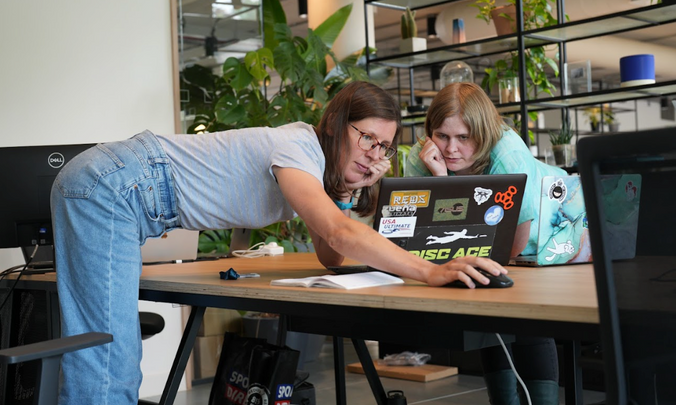
As the demand for programmers continues to grow and the number of available coders remains limited, coding bootcamps have emerged as a viable solution to give people from all walks of life, a chance to have a career in software development. We call this fair access for all.
These intensive programs give students the opportunity to train for a career in software development in just a few short weeks, rather than spending several years in college. But with so many coding bootcamp options available, it can be difficult to determine which one is right for you. This blog post breaks down the different types of coding bootcamps and explains what you should look for when evaluating your options.
What is a Coding Bootcamp?
There are a variety of coding bootcamps that you can find all offering a variety of specialisms.
Software Development Bootcamps
A coding bootcamp is an intensive program designed to teach students the skills needed to transition into a career in programming. They are often targeted towards professionals who are already working in other industries and want to switch careers. The average course lasts between three and six months, meeting a few hours per week in a group setting.
At the conclusion of the program, most students have enough knowledge to get a job as a junior software developer. A bootcamp will be instructor led, offer a set syllabus, and follow a defined program to teach students to be ready for a career in tech.
Whilst there may be some cultural differences in teaching style for a UK based coding bootcamp, the overall course content should reflect that of global tech standards.
Whilst many organisations still teach tech stacks such as MERN, we are pleased that our software development coding bootcamp teaches up to date industry standards including SQL and Next.js.
Cyber Security Bootcamps
A cybersecurity coding bootcamp typically focuses on teaching the skills and knowledge necessary to protect computer systems and networks from information disclosure, theft of or damage to their hardware, software, or electronic data, as well as from the disruption or misdirection of the services they provide.
Unity Game Development Bootcamp
In a Unity coding bootcamp, you'll quickly learn the Unity interface and delve into game design fundamentals, including game mechanics and user experience. The program emphasizes C# programming for scripting game behavior. You'll develop both 2D and 3D games, understanding sprites, animations, and physics. The course covers character animation, user interface design, and integrating immersive audio.
You’ll also get an introduction to AI in games, multiplayer game creation, and basics of VR/AR development. The bootcamp concludes with lessons on game optimization and publishing across various platforms, culminating in a capstone project. Additionally, it offers guidance on industry practices and portfolio development, preparing you for a career in game development.
What to look for in a coding bootcamp
When choosing a bootcamp, there are a few key factors to keep in mind. Reputation is especially important when selecting a bootcamp. For UK based coding bootcamps, ensuring that they are listed on the UK register of learning providers, like Tech Educators, is a good place to start.
When you’re evaluating different bootcamps, make sure to look at their job placement rates and the type of employers students go to, the backgrounds of their students, and the type of curriculum they offer. Make sure that the bootcamp has a curriculum that matches your interests and skill level. You want to make sure that you’ll be able to find a job after graduation. It’s important to do your research before selecting a bootcamp.
Main Types of Coding Bootcamp
Coding bootcamp delivery can be broken down into a few different elements. The time of the delivery of the bootcamp, be it Full-time or Part Time. The type of delivery being offered either in-person or remote. As well as the tech stack being offered.
At Tech Educators, our Introduction to Coding Bootcamp, Full Stack coding bootcamp and Unity Coding Bootcamp are all offered in person, or remote.
Full-time Coding Bootcamps
Full-time online bootcamps typically take around 9-16 weeks to complete and offer a cohort-based model in which students are taught in a classroom setting, split into small groups for coding challenges and progress through the course at the same pace. Full-time coding bootcamps in the UK will generally run from 09:00 in the morning until 17:00, replicating what can be a normal working day for most people.
Part-time Coding Bootcamps
Part-time coding bootcamps typically last between six and nine months. Students meet for a few hours every evening, with coding bootcamps in the UK, this will usually be between 18:00 and 21:00, as people will generally be working a daytime job whilst completing the coding bootcamp. With a part-time coding bootcamp, you’ll have more flexibility with your schedule but may have to spend more time studying than a full-time bootcamp. Part-time bootcamps may be a good option if you want to keep working full-time, want to be able to be more flexible with your schedule, or have a spouse or child who relies on you. Given the limited hours that a part-time coding bootcamp runs, it will take longer to complete the course than your peers who attend full-time.
In-person Coding Bootcamps
In-person, co-operative coding bootcamps allow you to take either a full-time, or part time. As the title suggests, an in-person coding bootcamp will be run by your instructor, face to face with other students. This allows you to spend time with your cohort and your instructor, as well as experience commuting to an office or place of work, which many employers may ask you to do once you get a job in tech.
Remote Coding Bootcamps
Remote coding bootcamps are fully online and allow you to work from anywhere in the world. Great remote coding bootcamps have dedicated teachers or teaching assistants that focus on the remote element of the course. When taking a remote coding bootcamp, take time to ask what type of engagement the bootcamp runs for people taking the bootcamp remotely.
Tech Stack Availability in the UK Coding Bootcamps
There are a number of differing tech stacks and areas that you can focus on when looking at a coding bootcamp.
Most people will be looking at a full-stack coding bootcamp that focuses on software development. Whilst many bootcamps focus focus on the MERN stack, being MongoDB, Express, React and Node.JS, there are other options available, such as MEAN which replaces React with Angular.Amazon Cloud Practitioner bootcamps are beginning to become a good way for individuals to break into the cloud computing space, however actual bootcamps delivering guided training are few and far between still.
Tech Educators teach a HTML, CSS, JavaScript, we then move into SQL for database management and Next.js as our core framework, after learning enough React to utilise it effectively.
Conclusion
Coding bootcamps are an excellent way to break into the tech industry. With so many options available, there is a bootcamp out there for everyone. When choosing a bootcamp, make sure to look at their reputation, accreditation, job placement rates, the backgrounds of their students, and the type of curriculum they offer. Make sure that the bootcamp has a curriculum that matches your interests and skill level.
Full-time online coding bootcamps are a good option if you want to break into the industry quickly and can afford to take that break from your current career. If you want to continue working full-time, or have a spouse who can take care of your kids while you attend class, part-time coding bootcamps are the more logical choice.
About the Author
James has 8 years with Fortune 200 US firm ITW, experience of managing projects in China, USA, and throughout Europe. James has worked with companies such as Tesco, Vauxhall, ITW, Serco, McDonalds. James has experience in supporting start-up and scale up companies such as Readingmate, Gorilla Juice and Harvest London. James completed his MBA at the University of East Anglia in 2018.


